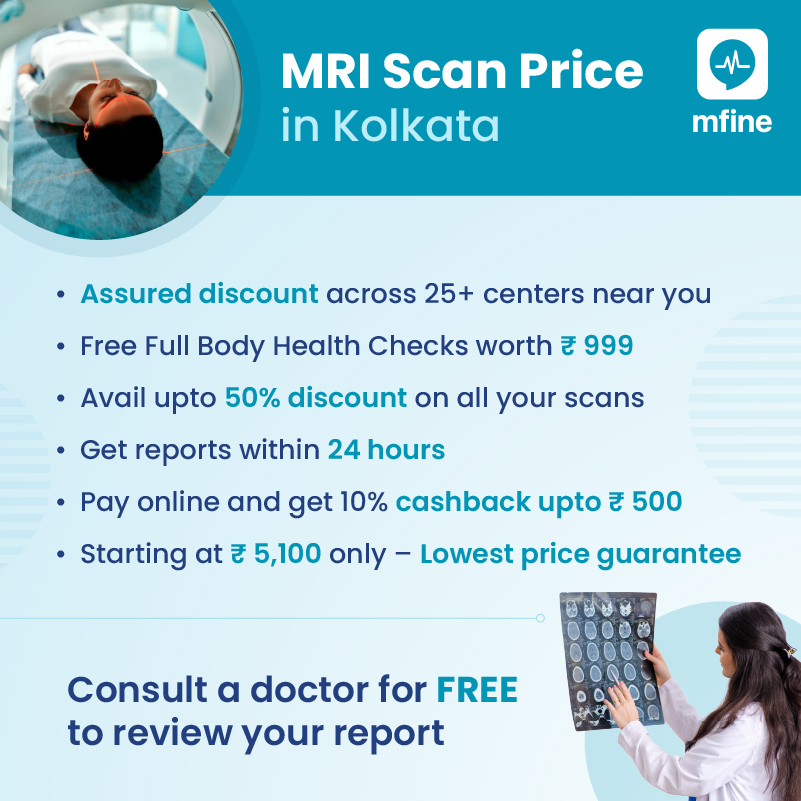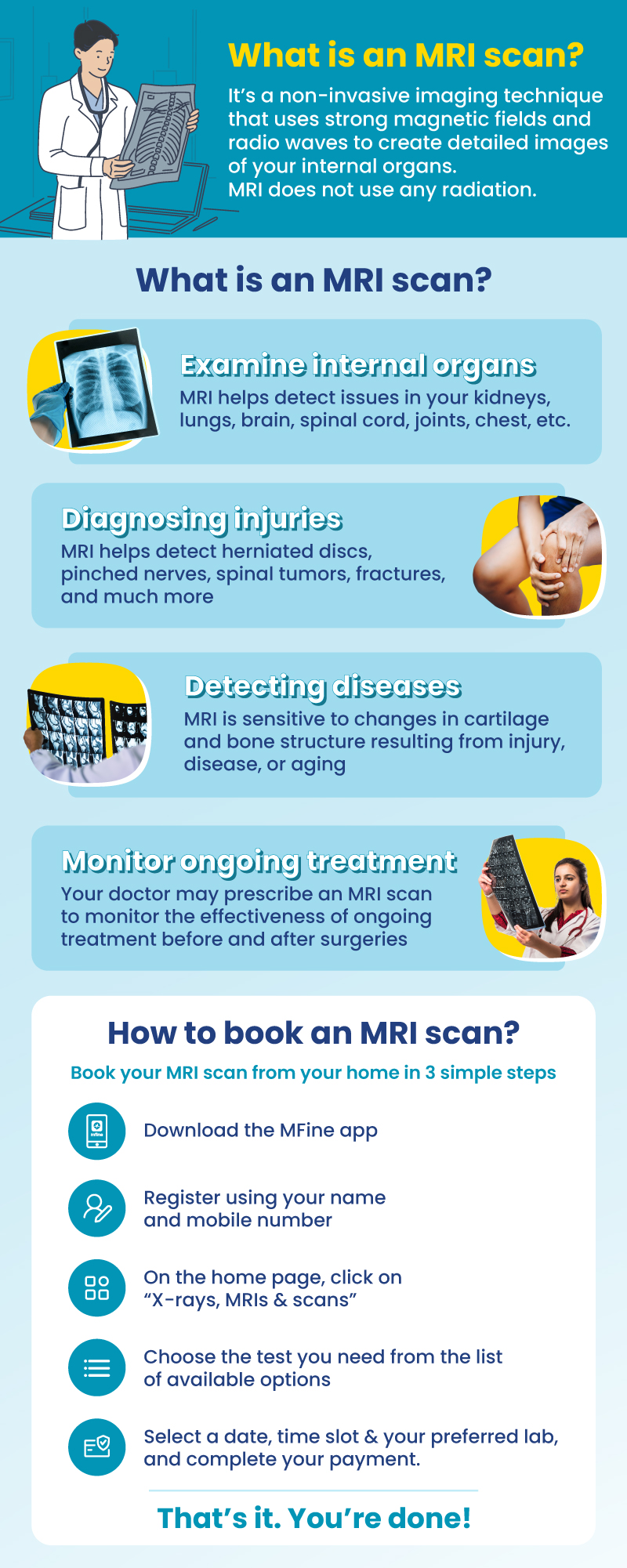
Avail discounts on Spine MRI scan costs in Kolkata. MFine offers you high-quality lab options, and an excellent discount of upto 50%, for your MRI Knee in Kolkata.
MRI Scan Knee in Kolkata by MFine
|
Want to save big on a Spine MRI in Kolkata?
The average market price is over ₹ 8,000, but with us, you’ll get your knee MRI for just ₹6,300 – a savings of up to 50%! Don’t miss out, click the button below to request a callback or call us at
☏08061970525. Our team is available to answer any questions.
Don’t settle for less when it comes to your health! When you book a scan with us, you will also get a FREE online consultation with a doctor.
Knee MRI scan costs in Kolkata
Presented below are the discounted prices for the most frequent knee MRI scans in Kolkata. Please bear in mind that these rates might change; for the most recent information, feel free to reach out to us.
| MRI Knee Cost in Kolkata | Offer Price |
| MRI Knee Price in Kolkata | ₹6300 |
| MRI Both Knee Price in Kolkata | ₹12600 |
Contact us at ☏08061970525 to book a convenient lab appointment at your preferred time.
Why should I book an MRI through MFine?
|
Exclusive Benefits with MFine
(1) Certified labs
Get access to over 600+ labs certified by NABL and NABH
(2) Same-day slot available
Get scans done on the same day
(3) Quick and convenient
Get reports in 12 hours and digital films in 15 – 20 minutes
(4) FREE Consultation
Post scans, consult a doctor for free to review your report
All about knee MRI scans
The knee joint connects the femur, tibia, and patella to enable essential movements like walking, running, and jumping. Behind its apparent simplicity lies a complex network of bones, cartilage, ligaments, tendons, muscles, joint capsule, and bursae, working in harmony to support the body and facilitate motion. However, the knee is not invincible, and injuries or conditions can occur.

Different parts of the knee joint
- Bones:
- Femur (Thigh Bone): The femur, the largest bone in the body, forms the upper part of the knee joint, providing support and acting as a crucial lever during movements.
- Tibia (Shin Bone): As the larger of the two lower leg bones, the tibia bears the brunt of body weight, ensuring stability during standing and walking.
- Patella (Knee Cap): Positioned in front of the knee joint, the patella protects the joint and enhances mechanical advantage by assisting in knee extension.
- Cartilage:
- Meniscus: Two crescent-shaped cartilage structures, the medial and lateral menisci, act as shock absorbers, cushioning the knee joint during activities and evenly distributing the load.
- Articular Cartilage: The smooth, glistening cartilage on the ends of bones facilitates frictionless gliding, preventing bone-on-bone contact and ensuring smooth joint movement.
- Ligaments:
- ACL (Anterior Cruciate Ligament): Positioned at the center of the knee, the ACL prevents excessive forward movement of the tibia relative to the femur, stabilizing the knee.
- PCL (Posterior Cruciate Ligament): Located behind the ACL, the PCL restrains excessive backward movement of the tibia relative to the femur, enhancing joint stability.
- MCL (Medial Collateral Ligament): Found on the inner side of the knee, the MCL safeguards against excessive inward bending of the joint.
- LCL (Lateral Collateral Ligament): Situated on the outer side of the knee, the LCL protects against excessive outward bending of the knee.
- Tendons:
- Quadriceps Tendon: The quadriceps tendon connects the powerful quadriceps muscles to the patella, facilitating knee extension and leg straightening.
- Patellar Tendon: Joining the patella to the tibia, the patellar tendon transmits the force generated by the quadriceps muscles to the lower leg during movements.
- Muscles:
- Quadriceps: Consisting of four muscles at the front of the thigh, the quadriceps muscles work in unison to extend the knee, playing a crucial role in various activities.
- Hamstrings: Located at the back of the thigh, the hamstrings flex the knee, enabling movements like walking, running, and bending down.
- Gluteal Muscles (Glutes): Positioned in the buttocks region, the gluteal muscles provide stability and support during weight-bearing activities.
- Joint Capsule: The knee joint is encapsulated by a sturdy joint capsule, a thin membrane that helps maintain joint stability. The synovial fluid within the capsule lubricates the joint, ensuring smooth movement.
- Bursae: Fluid-filled sacs called bursae act as cushions, reducing friction between tissues and allowing smooth gliding of structures during knee movements.
The Significance of Knee MRI Scans
The knee MRI scan holds significant importance in the field of medicine, especially when it comes to diagnosing knee-related issues. By utilizing powerful magnets and radio waves, this non-invasive imaging technique generates detailed images of the knee’s internal structures. The significance of knee MRI scans lies in their ability to:
- Accurate Diagnosis: Knee MRI scans aid in the accurate diagnosis of various knee injuries and conditions, such as ligament tears (ACL, PCL, MCL, LCL), meniscal tears, cartilage injuries, and fractures. The precise images obtained from the scan facilitate a targeted approach to treatment.
- Assessment of Degenerative Conditions: Knee MRI scans are essential in evaluating degenerative conditions like osteoarthritis, allowing healthcare professionals to monitor joint health and tailor appropriate treatment plans.
- Preoperative Planning: Before performing knee surgeries, such as ACL reconstruction or meniscal repair, knee MRI scans provide crucial information about the extent of damage, guiding surgeons in planning successful interventions.
- Monitoring Recovery: Post-surgery or during rehabilitation, knee MRI scans can be used to assess the progress of healing and ensure that the knee is responding positively to treatment.
Reasons for Ordering Knee MRI Scans
Knee MRI scans are ordered for various reasons, including:
- Traumatic Injuries: In cases of accidents or trauma, a knee MRI scan helps identify and assess the extent of injuries to bones, ligaments, cartilage, and soft tissues.
- Persistent Knee Pain: Patients experiencing persistent knee pain, swelling, or limited mobility may undergo a knee MRI scan to identify the root cause of their symptoms.
- Sports Injuries: Athletes and individuals involved in sports activities are prone to knee injuries. A knee MRI scan helps detect sports-related injuries and aids in prompt treatment.
- Chronic Conditions: Patients with chronic knee conditions, such as osteoarthritis or rheumatoid arthritis, may undergo knee MRI scans to assess the progression of the disease and guide treatment strategies.
- Unexplained Symptoms: If knee-related symptoms are unexplained by other diagnostic methods, a knee MRI scan can offer more comprehensive insights into the underlying issue.
What to Expect During a Knee MRI Scan?
A knee MRI scan is a safe and non-invasive procedure that typically lasts between 30 to 60 minutes. Here’s what patients can expect during the scan:
- Preparation: Prior to the scan, patients may be required to change into a hospital gown and remove any metal objects or jewelry that could interfere with the MRI machine.
- Positioning: The patient will lie down on a movable examination table, which will be gently slid into the MRI machine.
- Stillness: During the scan, it is crucial to remain as still as possible to ensure clear and accurate images. The MRI machine will emit loud noises during the procedure, but earplugs or headphones will be provided for comfort.
- Contrast Agent (If Required): In some cases, a contrast agent may be administered through an intravenous line to enhance the visibility of specific structures. This contrast material helps highlight areas of inflammation or abnormalities.
- Comfort: While MRI scans are generally well-tolerated, some patients may experience mild discomfort due to the confined space of the MRI machine. If needed, patients can communicate their concerns to the technologist, who can offer solutions to ease discomfort or claustrophobia.
FAQs
Does a meniscus tear show on MRI?
Yes, an MRI can effectively show a meniscus tear by providing detailed images of the knee’s internal structures.
Can meniscus tears heal?
Small meniscus tears can sometimes heal on their own with rest and rehabilitation, but larger or more complex tears might require surgical intervention.
Is an MRI of the knee better than an X-ray?
Unlike X-rays, MRIs do not use any ionizing radiation. Hence, MRIs are much safer than X-rays.
Read more on the types of X-rays.
Do you need contrast for an MRI meniscus tear?
Contrast dye is not always necessary for diagnosing a meniscus tear with MRI. It’s typically used to enhance certain details, but a non-contrast MRI can still provide valuable information.
Do all meniscus tears show up on MRI?
Most meniscus tears are visible on MRI, but some very small or subtle tears might be harder to detect, especially without the use of contrast.
Can MRI be wrong about meniscus tear?
While MRI is highly accurate, there’s a slight possibility of misinterpretation. Clinical correlation and expertise are important for accurate diagnosis and treatment decisions.
Read about Are MRI scans safe for everyone?
Other topics you may be interested in:
| For further assistance call us on ☏08061970525 |

 Call us:
Call us:


 Call
Now
Call
Now